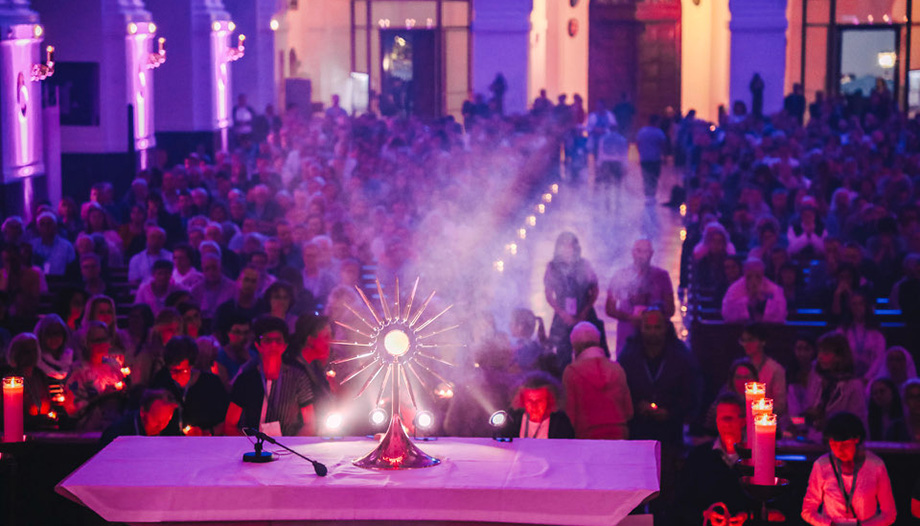Hundreds of thousands of young people from all over the world have gathered on the "Marienfeld", an area of 260 hectares about 50 kilometers east of Cologne, to participate in the 20th World Youth Day WYD, which will be held from the 18th to the 21st of that month.
Benedict XVI, elected Pope four months earlier, on April 19, not only wanted to continue the WYD tradition begun by his predecessor John Paul II, but he also wanted the WYD 2005 theme "We have come to adore Him" to become an act of Eucharistic adoration. As night fell, the Solemn Exposition began. Where hundreds of thousands of voices could be heard before, there is a shuddering silence.
Against the advice that some had given Benedict XVI, the Pope had been confident that the young people would really take the WYD motto literally: they - many of them, kneeling in the mud - had come to adore the Lord in the Eucharist.
The official website of WYD in Germany reported the testimony of one of those present: "What a feeling when the vigil culminated in a great adoration of the Blessed Sacrament! A million young people in silence before the Lord!"
Just as the days leading up to John Paul II's passing gave visibility to a prayer that seemed forgotten in the trunk of "preconciliar" memories, with hundreds of people - many of them also young people - praying the rosary in St. Peter's Square, the vigil of Saturday, August 20, 2005 marks the beginning of the rediscovery of Eucharistic adoration in many places. Now, let's stick to the country that hosted the 20th WYD, Germany.
The initiative Nightfever
One of the initiatives that came into being after WYD in Cologne was "Nightfever": on October 29, 2005, two university students - Andreas Süss, now pastor in Neuss, and Katharina Fassler, from the Immanuel community, now married and mother of four children - invited young people between the ages of 16 and 35 to participate in the parish of St. Remigius in Bonn. On their website they explain the purpose of these "nights of adoration": "The focus of Nightfever is prayer, the conversation with God. We gather before the altar to adore Jesus in the form of bread. As we are, with all that depresses us or makes us happy, we can approach Jesus and talk to him about everything, as with a good friend".
The extraordinary reception of what was originally planned as a one-time activity made it a regular event. Already in 2006 it was extended to other German cities: Freiburg, Erfurt, Cologne and Mainz. Today, after a pause due to COVID restrictions, Nightfever is held in more than 80 German cities. After making the leap to Vienna, the event now takes place in 200 cities in 27 other countries.
In addition, Adoration before Jesus in the Sacrament of the Blessed Sacrament has been reintroduced in a number of parishes. It does not always have to be perpetual adoration, i.e., 24 hours a day, as in St. Clemens Church in Berlin. In other churches it is celebrated once a week, mainly on Thursdays, Fridays or Saturdays, before or after evening Mass.
The website of the Archdiocese of Berlin alone - where Catholics make up about nine percent of the population - lists the Eucharistic adoration schedules in more than 20 churches. And in the cathedral of the German capital - under construction for several years and scheduled to reopen in 2024 - a "chapel for adoration" is planned.
The "Adoratio" Congress
Another initiative in this context is the "Adoratio" Congress, which has been held in the town of Altötting since 2019, organized by the "new evangelization" department of the Diocese of Passau, in whose territory Altötting is located.
On its website it describes itself as follows: "Adoratio is the Congress on Eucharistic Adoration and the Renewal of Faith in the German-speaking world. It is inspired by the international congress on perpetual Eucharistic adoration, which was first held in Rome in 2011."
We reproduce below an excerpt from the interview I had with Ingrid Wagner, director of the above-mentioned department, on the occasion of the latest Adoratio" Congress, held from June 9 to 11. This is how he summarized the objective of the Congress: "The core of the Congress and our deepest aspiration is that God be adored and venerated, that he be given the place he deserves, both in the life of each person and in the life of the whole Church.
This is concretized in that during the three days in Altötting we will celebrate Holy Mass, we will have common moments of prayer and adoration, and there will also be the possibility to adore the Lord in silence. One of the objectives of the Congress is also to create many places of Eucharistic Adoration in our country and beyond."
In relation to the processes of reform in the Church, Ingrid Wagner said: "The search for true renewal always consists in understanding more deeply who God is and who we are, and what our response is to his constant search for us. We believe that true reform must always be based on prayer, because then, as Church, we revolve around God and not around ourselves. This encounter with Him changes us, first ourselves, and that in turn will change the world."
Referring to the fact that the Congress is being held at Germany's best-known Marian shrine, he commented: "Our Lady plays an important role in the Congress because she is our greatest model of renewal and adoration. Her yes has changed the world and, with this year's Adoratio Congress, we also want to renew our yes to God".











